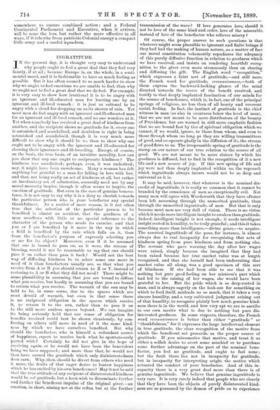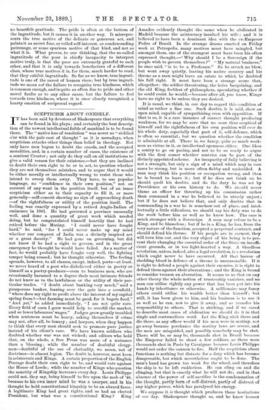INGRATITUDE.
IN the present day, it is thought very easy to understand why people ought to feel a great deal that they feel very faintly, if at all ; because Europe is, on the whole, in a senti- mental mood, and it is fashionable to have as much feeling as possible. But it has often seemed to us much harder to show why we ought to feel emotions we are unable to feel, than why we ought not to feel a great deal that we do feel. For example, it is very easy to show how irrational it is to be angry with an ignorant and ill-educated man for hurting one by an ignorant and ill-bred remark : it is just as rational to be angry with a cloud for dropping on us its shower of rain. Yet most men do feel angry with an ignorant and ill-educated man for an ignorant and ill-bred remark, and no one wonders at it. Yet when somebody has received a great deal of kindness from another, and the recipient shows no gratitude for it, every one is astonished and scandalised, and doubtless is right in being astonished and scandalised, though it is very much more difficult to show why it should be so, than to show why one ought not to be angry with the ignorant and ill-educated for showing their ignorance and ill-breeding. Except, of course, on the basis, the true basis, of an intuitive morality, how can you show that any one ought to reciprocate kindness ? The kindness was unsolicited ; perhaps, even, it was undesired; nay, it might have been unwelcome. Many a woman has felt anything but grateful to a man for falling in love with her, and that, not being really an act of kindness at all, but rather an involuntary act of admiration, assuredly need not by any moral necessity inspire, though it often seems to inspire, the emotion of gratitude. But even in the case of genuine benevo- lence, it is not easy to say why it is a duty to cherish towards the particular person who is your benefactor any special thankfulness. As a matter of mere reason, is it not often true that the selection of the particular person to be benefited is almost an accident, that the goodness of a man overflows with little or no special reference to the character of the person who needs its exercise, and that you or I are benefited by it more in the way in which a field is benefited by the rain which falls on it, than from the benefactor's purpose of expressly selecting you or me for its object? Moreover, even if it be assumed that one is bound to pass on, as it were, the stream of blessing, would it not be reasonable to say that one should pass it on rather than pass it back ? Would not the best way of diffusing kindness be to select some one more in need of it than benefactors usually are, so that what you receive from A or B you should return to X or Y, instead of restoring to A or B what they did not need ? There might be some plausibility in assuming that you are bound to diffuse what you receive, but hardly in assuming that you are bound to return what you receive. The warmth of the sun may be held to be, in some sense, due to the spaces which are most devoid of warmth, but even in that sense there is no reciprocal obligation in the spaces which receive it, to return it to the sun, rather than to pass it on to the still more sunless spaces beyond. We can imagine its being seriously held that our sense of obligation for benefits received could best be shown vicariously, by con- ferring on others still more in need of it the same kind- ness by which we have ourselves benefited. But why should the benefactor, who is himself a redundant source of happiness, expect to receive back what he spontaneously parted with ? Certainly he did not give in the hope of receiving again, or he would not have been the benevolent being we have supposed ; and more than that, he would not then have earned the gratitude which only disinterestedness does earn. Why, then, should he divert from others who need it more, the fruits of that eager desire to bestow happiness which he has excited by his own beneficence ? May it not be said that the true attitude of any recipient of disinterested kindness would be not gratitude, but a keen wish to disseminate further stud further the beneficent impulse of the original giver,—an emotion, in short, aiming not at the reflux, but at the further transmission of the wave? If love generates love, should it not be love of the same kind and order, love of the miserable, instead of love of the benefactor who relieves misery P Of course, the proper answer to such questions is that whatever might seem plausible to ignorant and finite beings if they had had the making of human nature, as a matter of fact our moral constitution vehemently repudiates the adequacy of this purely diffusive function in relation to goodness which we have received, and insists on rendering heartfelt recog- nition to the giver even more strenuously than on sharing and diffusing the gift. The English word " recognition," which expresses a faint sort of gratitude,—and still more the French word for gratitude, reconnaissance,—both of them express the backward-looking glance of the mind directed towards the source of the benefit received, and testify to that deeply implanted fascination of our minds for the source of beneficence, which is, in fact, one of the principal springs of religious, no less than of all hearty and reverent social, feeling. In fact, the instinct of gratitude is the chief witness in man (as also in creatures below the level of man), that we are not meant to be mere distributors of the bounty of Providence, but are warned in still more emphatic fashion that we are bound fast by ties of spiritual obligation which we cannot, if we would, ignore, to those from whom, and even to those through whom (so long as they are willing transmitters of good, and co-operate gladly in the diffusion of it), the stream of good flows to us. The irrepressible spring of gratitude is the stamp on our nature of our true relation to the source of all good. We are not meant to be mere sluices by which his goodness is diffused, but to find in the recognition of it a new life and a new source of joy. If this new spring of life and joy were not thus deeply implanted within us, the reproach which ingratitude always incurs would not be so deep and universal as it is.
It may be said, however, that whatever is the nominal dis- credit of ingratitude, it is really so common that it cannot be branded by the conscience of men as exceptionally evil. Not many men will agree with Wordsworth that they have oftener been left mourning through the unmerited gratitude, than through the unmerited ingratitude, of men. But that is only because most men are very dull of vision. There is no virtue which it needs more intelligent insight to awaken than gratitude. Indeed, intelligent insight is not enough; it needs intelligent insight rooted in humility, to be truly grateful; and this it takes something more than intelligence,—divine grace,—to acquire. The asserted ingratitude of the poor, for instance, is almost always due to real incapacity for recognising teat acts of kindness spring from pure kindness and from nothing else. The servant who gave warning the day after her wages were raised, simply because she imagined that they had been raised because her true market value was at length recognised, and that she herself had been underrating that market value all along, was a good specimen of this sort of blindness. If she had been able to see that it was nothing but pure good feeling on her mistress's part which had led to the raising of her wages, she would have been grateful to her. But the pride which is so deep-rooted in man, and is always eagerly on the look-out for something on which to feed itself, misleads us so much, that it takes a very sincere humility, and a very cultivated judgment arising out of that humility, to recognise plainly how much genuine kind- ness there is in the world, and how very apt we are to ascribe to our own merits what is due to nothing but pure dis- interested goodness. In some respects, therefore, the French word reconnaissance is better than either " gratitude " or "thankfulness," for it expresses the large intellectual element in true gratitude, the clear recognition of the motive from which the beneficent act proceeds, as the proper source of gratitude. If you misconceive that motive, and treat it as either a selfish desire to avert some mischief or to purchase some further advantage on the part of the nominal bene- factor, you feel no gratitude, and ought to feel none ; but the fault there lies not in incapacity for gratitude, but in incapacity for interpreting aright the motive which actuated the conduct of your benefactor. And of this in- capacity there is a very great deal more than there is of genuine ingratitude. We believe that genuine ingratitude is very rare. It is very rarely indeed that people who see clearly that they have been the objects of purely disinterested kind- ness are so possessed by the demon of pride as to experience no heartfelt gratitude. The pride is often at the bottom of the ingratitude, but it causes it in another way. It misrepre- sents the true motive of the delicate or generous act, and paints it as secret fear, or veiled self-interest, or condescending patronage, or some spurious motive of that kind, and not as what it is. What proves, to our thinking, that the so-called ingratitude of the poor is chiefly incapacity to interpret motive truly, is that the poor are extremely grateful to each other, and that it is only towards benefactors of a different class, whose true motives it is, for them, much harder to read, that they exhibit ingratitude. So far as we know, true ingrati- tude is one of the rarest of human vices ; but by true ingrati- tude we mean not the failure to recognise true kindness, which is common enough, and is quite as often due to pride and other moral faults as to any other cause, but the failure to feel towards true kindness, where it is once clearly recognised, a hearty emotion of reciprocal regard.







































 Previous page
Previous page